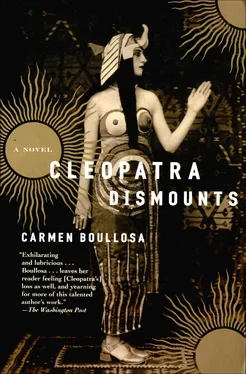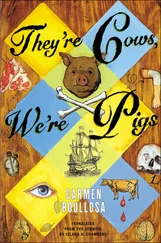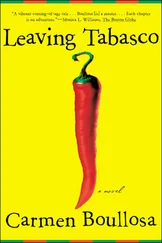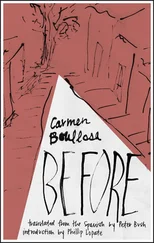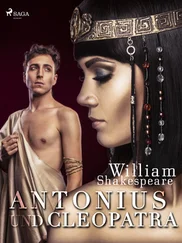That night, on my return to the palace, after Apollodorus had left me alone, I slept with no more dreams of decapitated bodies whose heads had been hidden for me to find in one or another corner of the palace. I slept without dreaming in the unnerving colors that brought panic to my nights. I slept without hearing uncanny music in my dreams.
The next morning I told my trusted advisors to start think about which king they were going to look for as a husband for Cleopatra. I had no intention of spending my life among eunuchs. That was not a suitable fate for me. But I did not want some boy-man in my bed. I refused to favor anyone with my desire unless he could prove a boon companion. The queen had a weakness: she needed a man she could count on for company.
The second day of my recovery, I dispatched from Alexandria a splendid wedding present to Antony and Octavia, along with another gift for Octavius, to congratulate him on the healthy direction his government was taking and on the recent renewal of his friendship with Antony, whom, I wrote, I still considered, like Octavius himself, a close ally of Egypt.
The third day of my recovery, I spent without any taint of displeasure. I was fully mistress of my throne and of myself again. I told myself that the storm had passed, and for good. I forgot that I had said I needed a man at my side. I looked at myself and saw nothing that resembled a weakness.
By the time the fourth day had arrived, I felt completely and permanently cured of the pain of Antony’s desertion. As soon as I got into bed, I started to enjoy the stillness of the night. Sleep slowly possessed my eyelids, more delightfully than usual, thanks to my fatigue. But then
Savage Love seized me by the hair
And would not let me sleep the whole night long.
It said to me: “Cleopatra, queen of Egypt you may be, / But my slave you remain, ten thousand times the lover of Mark Antony. / Do you think you have grown so robust that you can sleep here all alone?” I leapt barefoot from my bed, half-naked. Not waiting to rouse my maids, I hurried out of the sleeping quarters and, untrammeled by sandals, my feet felt an urge to walk and walk, to escape my dread desire. Without a second thought, I left the palace and began to run, as if running would let me escape the memory of my nighttime strolls with Antony.
The streets of Alexandria were empty. Men’s voices, the creaking of wheels, the bumping of boxes on carts, the grunting of beasts of burden, the songs of birds, even the barking of dogs — all quite absent.
Trembling from my bed and its dream, driven by insatiable desire, I dashed all alone both hither and thither, for it was impossible to find the only man I wanted to kiss. I did not walk, really I ran, fleeing all the places where tyrant Love knows how to ensnare his victims.
My despair got wilder and wilder. If I had leapt terrified from my bed, I was now terrified of every single thing. My eyes saw all objects in a bright light that glowed with a painful intensity and almost burned me. Everything lay in semi-darkness — for it was the middle of the night and the street lamps had been extinguished by the watchman — but a light shone with a dangerous insistence from every object.
It was a moment of dreadful darkness, though darkness is hardly the right word when everything glowed bright enough to hurt me. My grief was literally splitting my heart in two and mockingly rubbing one half against the other. In the recent past, I had not been strong enough to bear the sight of the sun. I had stayed in my bedroom, wanting to know nothing of Egypt. I had suffered, drowned in my miserable tears. But all this was nothing compared to the grief that possessed me now; and it had come without warning, because I believed myself free of him, free of my sickly attachment to Mark Antony, the man who did not love me. Now the very objects of my world were hostile to me. The universe had sided with him: it had joined him in his rejection of me. I was a mere nuisance, a superfluity in the world. I needed to be cast out violently from land and sky and the winds the gods unleash. Objects touched me and called out, “Enemy, enemy, enemy!” It was a fearful moment, but when I compare it to the moment in which I now speak, I envy myself that experience. I would choose to be back there, to be that woman again, once more to be Cleopatra.
Then at some point, my eyes glimpsed a sharp piece of metal on the ground. I picked it up, grasping it firmly. A little farther along, some fist had used the metal to scratch a message on the wall and then tossed it away to avoid suspicion. The message read:
My name is not Cleopatra.
I wasn’t born a woman or the child of a drunken king.
My father drank water and kept bees.
I am a slave.
I wasn’t, I won’t be, I don’t want to be a Lagid,
But the mystery of my soul is as deep as that of the wretched queen!
Beside the words, he had started to daub a face with a huge nose and pronounced wrinkles on the neck, as if in mockery of me. The sketch got my nose right but those wrinkles belonged more to Arsinoe than to me.
“Wretched queen!” What a slap in the face! Seeing my name written with such contempt, I saw with total clarity how the rejection of Mark Antony had torn me to pieces, that my face had become a shapeless lump. I thought I saw that when morning came to this same street, two or three dozen women with faces exactly like mine would be walking here. My hair was disheveled, and the same lack of care was apparent in my face. These women, my counterparts, each one of them would be exactly like Cleopatra, though none with hair as disordered as mine. So there was nothing unique about me anymore! I was a mere nobody, Antony, because you had erased me. I saw your hands, your fat fingers with the palms too big for them, I saw them molding one of those shapeless faces out of clay. I saw your hands holding the sharp metal I had just picked up from the ground, and with it you scratched features into my face, without any bleeding, as if I were clay also, but for all that, I suffered excruciating pain.
This horror at seeing myself erased by you and then repeated in so many other women had a red-stained edge to it, the color of blood, and it came with a pain beyond bearing. Then it took pity on me and withdrew its fangs and was replaced by a chill breath of wind. The breeze on my face spurred me to tears and I felt a sense of relief. I remained motionless, while my grief disfigured not just my face but the whole city. I wanted to die. I thought I was dying. The wet tears on my face turned to fire, became rivers of lava, and, the worst of all torments, the sand frozen by night. And I, the queen, was the victim.
At first I had not heard two men approaching. They were chatting and, after they saw me, they used their lamps to read the inscription on the wall. Then they started to shout. By now I’ve heard the story of that meeting told a thousand times. I can imagine clearly, I can see and hear that before they saw me, the two friends were exchanging laughs and teasing phrases about the endless party they were returning from so late at night. They were Philostratus and Crinagoras of Rhodes. But they had not a drop of wine in their veins, for they had been dining at the austere table of Olympus, the sage who has since become my doctor, and who now, in this final hour, remains faithful to me. They had sat in the open air, their only light the pale starshine, but they had spoken and listened their fill. Around this table pranced neither musicians nor dancers, neither comedians nor poets. They wore no garlands and reclined on no cloth of gold. They had only the herb garden of Olympus and his secretaries and students, men who clad themselves in coarse white wool, the plain dress of shepherds. In all this, there had been a gentle, moving simplicity, even though a student, who was not of their number but was studying mathematics, an arrogant youth with the long curly hair of a child — years later he would give himself out to be a prophet — had irritated them with his impertinent questions and his drinking of wine. They were making fun of his drunkenness and his questions at the time they bumped into me. On seeing me, Philostratus exclaimed, “There’s another drunk, and this one’s female! What kind of milk are mothers giving their children nowadays that they grow up with such feeble bones? One cup of wine and they fall over and talk drivel!”
Читать дальше
